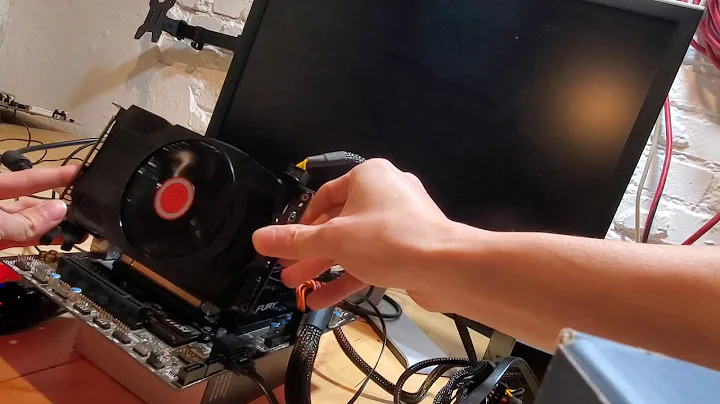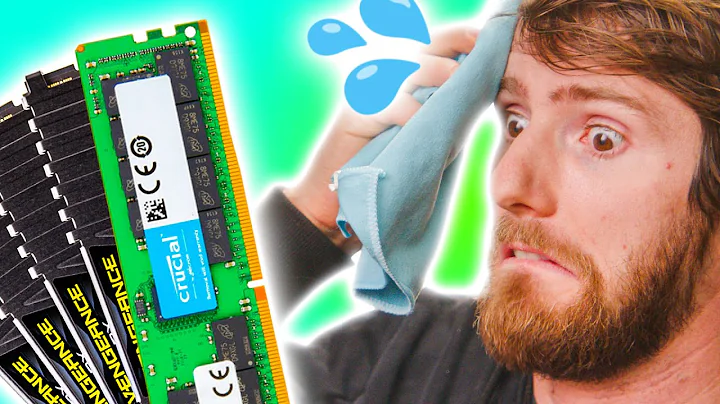Is it safe to use RAM with a damaged capacitor?
Solution 1
From an electronics design background that is almost certainly what is known as a "filter capacitor".
It connects a power or data line to ground in order to filter out high frequency noise. Depending what line it is on it may be just some extra protection.
If your memory is operating at the cusp of limits then a broken capacitor may cause the chip or some lines within it to be slightly noisier than expected.
What will happen is difficult to say though. Everything might well work fine for years with absolutely no problems or errors, you might get a bit error in memory once a week, or you might have an entire memory bank dead.
If it came to you damaged then send it back as such.
If warranty return is not an option, or you are just curious if everything is fine anyway, then there's no harm in running Memtest86 and seeing if it works.
Solution 2
By the placement I'd assume it's a decoupling/bypass capacitor. Although there's no guarantee, most products will work fine with a single missing decoupling capacitor.
You might want to make sure the PCB pads aren't shorted, but from the picture it looks fine.
You could have a higher chance at bit errors, so performing a memory test is a good idea. Decreasing the memory frequency could help if you get any errors, although I think this is unlikely to be needed.
Solution 3
I've designed many boards for many companies. It is safe to use and you won't notice any difference or error unless you overclock to the limits. There are many other decoupling capacitors doing the same job (simply said) and one missing isn't dramatic. Just make sure the contacts are clean and no solder particles are left floating on the module.
Solution 4
I believe you should not use the module. The capacitor is to filter and damp out any “surges” and also to protect the memory in the module. The memory could fail which in turn may corrupt or damage data.
I would remove the module and replace it if this was my machine.
Solution 5
As already noted, that part is almost certainly a bypass capacitor. If the memory is operational, then the part is an open circuit (if it were short circuit the power to the memory subsystem, which includes the DRAM controller would be at 0V and would therefore not be operational at all).
That does not mean you could not develop a short circuit as the debris may migrate and cause one in the future to show but one scenario (there are others). That would not necessarily damage the device or controller but that depends on many factors such as power sequencing. It is possible such an issue could cause the local voltage regulator on that particular power rail to self-destruct (that depends on whether short circuit protection has been provided).
Many complex logic devices have a need for a specific power up / power down sequence as there are very often numerous power rails attached and an incorrect sequence can break down barriers between power domains. When that happens, it is possible to render the part damaged to the point of requiring replacement.
If I were not sending the module back, I would remove the old capacitor and probably fit a new one.
The effect of not having that particular bypass device present will be data transfer errors, and possibly refresh errors (refresh is required in dynamic memories as the data is stored internally on a very small leaky capacitor formed by the gate to channel of a MOSFET).
If the damaged part were completely removed it would probably have little effect apart from the previous paragraph (and certainly nothing physically catastrophic to the memory) as modules are designed to a particular requirement which includes power.
Related videos on Youtube
Павле
Updated on September 18, 2022Comments
-
 Павле over 1 year
Павле over 1 yearWhile inserting a new DDR4 RAM module in the second slot of my laptop, I broke one of the capacitors (see image).
To my surprise, my Windows 10 started normally indicating that new RAM is available (24 GB in total). It seems to work normally. I ran Memtest by HCI Design with full RAM coverage and it didn't report any errors.
Is it safe to use such broken RAM? May it somehow break my hardware or software?
-
 IronEagle over 3 yearsThe answers below are correct, the capacitor is likely essential to the long-term life of the RAM. I'd just like to add that the pads on the board itself do not appear to be damaged; it is possible that if you have a friend that is handy with SMD soldering you could repair it quite easily. Most difficult part would be determining the correct capacitance.
IronEagle over 3 yearsThe answers below are correct, the capacitor is likely essential to the long-term life of the RAM. I'd just like to add that the pads on the board itself do not appear to be damaged; it is possible that if you have a friend that is handy with SMD soldering you could repair it quite easily. Most difficult part would be determining the correct capacitance. -
gronostaj over 3 years
-
brenzo over 3 yearsChances are the capacitor isn't critical to the functionality of the memory but performance might degrade (a bit error every hour, day or whatever). I'd personally solder the cap back on if you can't return it under warranty, and otherwise buy a new one. The potential pains of using bad memory far outweigh the cost of just buying a new module.
-
BeowulfNode42 over 3 years@brenzo people weighing up how much their money is worth to them vs what risks they are willing to take, is highly subjective. All we can do is highlight what the risks could be and suggest options on either fixing or replacing the faulty parts. It might be the only risk is that their game crashes 2% more often, or it could be like this whoopsie forbes.com/sites/timworstall/2013/02/13/… , or it could be it will kill other hardware in the laptop.
-
-
BeowulfNode42 over 3 yearsThere's no need to wait to be out of warranty to run Memtest.
-
 Mokubai over 3 years@BeowulfNode42 point taken, amended that sentence.
Mokubai over 3 years@BeowulfNode42 point taken, amended that sentence. -
TooTea over 3 yearsWhile you're right in principle, anyone using non-ECC memory (i.e. almost everyone) runs the risk of random data corruption all the time. RAM errors do happen all the time, with or without filter capacitors. It's hard to quantify how much larger the bit error rate is going to be just due to a broken off bypass cap; thus there's no base to justify buying a new module.
-
 John over 3 yearsThe capacitors there may also filter out (even out) any ringing on the voltage changes. Still I think it reasonable to replace the module as it is better to have the capacitor at least in place and correctly connected.
John over 3 yearsThe capacitors there may also filter out (even out) any ringing on the voltage changes. Still I think it reasonable to replace the module as it is better to have the capacitor at least in place and correctly connected. -
 bradbury9 over 3 years"If it came to you damaged"... but the OP says "I broke one of the capacitors"
bradbury9 over 3 years"If it came to you damaged"... but the OP says "I broke one of the capacitors" -
 Mokubai over 3 years@bradbury9 that part of my answer was aimed at addressing future visitors to this question where damage in transit may be an issue. If OP did it then it is, I believe, not a warranty issue.
Mokubai over 3 years@bradbury9 that part of my answer was aimed at addressing future visitors to this question where damage in transit may be an issue. If OP did it then it is, I believe, not a warranty issue. -
Peter Mortensen over 3 yearsAre you sure about that? Aren't they "just" decoupling capacitors?
-
 John over 3 yearsI have read technical articles about that. I am not certain, but I have read that, and it makes sense to me. Any rapidly changing voltage (on, off) may need to be damped. I am not certain.
John over 3 yearsI have read technical articles about that. I am not certain, but I have read that, and it makes sense to me. Any rapidly changing voltage (on, off) may need to be damped. I am not certain. -
Peter Smith over 3 years@John. The voltage transitions during operation are fast but quite small. A ceramic capacitor (which is what these are) will not provide damping in any real sense as their ESR is so low although ESL also becomes important for fast transitions. They are there to prevent power droop during device operation. They will not solve any ringing anywhere other than on the power rail.
-
jamesdlin over 3 yearsCould still be a potential warranty issue if the capacitor wasn't securely soldered on, making it prone to damage.
-
hlovdal over 3 yearsDave Jones has a video about the electrical aspect of removing decoupling caps, aka "Muntzing".
-
BeB00 over 3 yearsNote that in order to be "really thorough", you will need to run memtest a number of times, maybe 8, maybe more (superuser.com/questions/547822/…) (32?)





